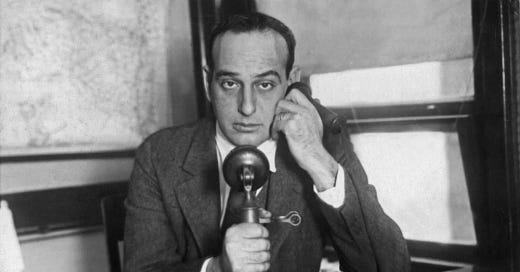Fear and Opioids in Academic Medicine
Regard for power implies disregard for those without power; part 3
This is the fourth and final of our essays on power. The first three are here and here. I’ve been thrilled to feature some of our readers. We hope you have enjoyed these.
Adam Cifu
“I’m nervous. I don’t know what will happen.”
I, then a 50-year-old associate professor of medicine, said those words over the phone to a friend late one night in 2017. It was the night before a health ethics conference at a university. A Canadian expert, with a reputation for castigating North America’s opioid prescribing, had flown in to balance out the presentation I would give.
“Well,” my friend advised, “if you’re feeling nervous right now, that is because the thing you are about to do might upset people, and that takes courage.”
It felt like I was hearing this for the very first time.
Why was I unsettled? I feared I was putting myself in tension with powerful people and institutions. By 2017, I had started to take a position that was uncomfortable for me, not because I didn’t believe it but because I knew it displeased others. Drug overdoses were on track to take the lives of over 70,000 in the US. The Centers for Disease Control and Prevention had declared “at least HALF of all opioid overdose deaths involve a prescription opioid.”1
Policy advocates, bereaved families, physicians, and many others offered definitive guidance: reduce prescribing to save lives. Governor Pete Shumlin of Vermont, speaking in 2016, captured the zeitgeist:
“We didn’t have a heroin crisis in America before OxyContin was approved and started being handed out like candy. If politicians would lead a more rational conversation about how we manage pain in America, we could fix the majority of this problem with a click of our fingers”
I had always considered opioid prescribing perilous. I published research on misuse of prescriptions, and profiled the two-decade torrent of prescriptions. Of course deceptive marketing played a role, but US prescribing habits reflected the US medical profession’s own ailment. We had helped create a reimbursement system that favors procedures, scans and devices, and penalizes time spent listening to patients. We did that ourselves, long before OxyContin and Purdue-Pharma.
Our reaction to this crisis reflected our pathologic attachment to quick fixes. There was a rapid rise in the termination and reduction of prescribed opioids in patients who had been on them for years, many of them disabled by complex conditions no one had fully sought to understand.
From these reductions, whether they proceeded quickly or slowly, I saw terrible outcomes. Patients were medically destabilized or traumatized by a health care system that had not earned their trust in the first place.
I argued that across-the-board reductions in long-term recipients embodied a medical practice built on social contagion, not compelling clinical evidence. Later papers substantiated these warnings.
To be clear, a substantial number of patients who reduce doses obtain good outcomes. It is often those who want and seek that change, and whose doctors engage with a posture of respect for them and their pain. But in the US, such cautious respect has been too rare. That’s partly because authorities enshrined across-the-board reductions as policy, or preached tapers as a kind of “tough love” toward patients they see as irrational.
My advocacy drew divergent reactions from my peers. Many colleagues spurred me forward, privately confessing they didn’t feel safe speaking up despite fear that they were being pressured to harm their patients. Some admitted that they had already done so.
And yet, often enough, someone – usually a doctor with regional or national prestige -- would call me, or call a colleague, or call one of my bosses to complain. They would suggest I was misguided, dishonest, or perhaps bought and paid for. I remember every episode:
A doctor acting as plaintiff’s witness in the opioid litigation called to ask if an op-ed of mine was encouraged, in any way, by a publicity firm. (It was not).
After my colleagues and I began research to understand the post-opioid suicides, another physician – again a paid expert witness in ongoing opioid litigation -- denounced our study in our local paper.
Another expert wrote me a private letter to condemn my public advocacy. A few months later, that expert’s name appeared on a scientific panel that had reviewed my team’s application for research funding.
The fact that these interactions rattled me is not surprising. I did not gain entry to medical school and attain the rank of professor by rebelling against the powerful. Respect for the standards by which one is judged is adaptive in academic medicine. However, this respect can be maladaptive when it leads to respect for people or policies that do not deserve it.
But “regard for power implies disregard for those without power,” and there is something in me that has always recoiled against making the short end of the stick even shorter for whoever is already on that end.
This something in me still persists, even after the indignities of crawling my way into the medical profession left me with a lot more respect for the powerful than I’d ever had before medical school. Cautious professionals, it turns out, try not to burn what they’ve built.
And yet, part of me rages at seeing people mistreated.
If one has the misfortune of worrying about irritating the powerful while also resenting what they do, there’s a skinny but still walkable path forward. I challenge, but usually with the support of allies. I ask those allies to scrutinize what I wish to say. Once, the night before visiting the Centers for Disease Control and Prevention to urge them to clarify their misfiring 2016 opioid prescribing guideline, I sent my slides to a colleague with a simple subject line: “Please check for BS.” Clear, fact-based statements mitigate emotional resistance.
The friend who counseled me that night in 2017 is not the first to ever observe that fear and courage can be two sides of the same coin. He might, however, have been the first one I heard, in a way that made sense to me. He reminded me of the obvious, and allowed me to act as I wanted to, decisively and with less regard for the powerful.
Stefan G. Kertesz is professor of medicine at University of Alabama at Birmingham Heersink School of Medicine and practices in the Birmingham Alabama Veterans Health Care System. His views do not represent formal positions of the federal government. His team’s study of suicide after prescription opioid change, CSI:OPIOIDs seeks interviews. Learn more here. Dr. Kertesz is on X: @StefanKertesz
They later corrected this when it became clear they had miscounted fentanyl deaths.





The post by Professor Stefan Kertesz of UAB resonates strongly with my experiences, then and now, that span a 60-year life in medicine. I make reference to three particular sentences Stefan makes:
▶︎ "We had helped create a reimbursement system that favors procedures, scans and devices, and penalizes time spent listening to patients. We did that ourselves, long before OxyContin and Purdue-Pharma."
The above topic easily could be the focus of a 5-day international medical conference. We stopped "Talking to Patients" and lost our focus on patient outcome only to replace that Holy Grail with physician and medical center income. We forgot the take home message:
"One of the essential qualities of the clinician is interest in humanity, for the secret of the care of the patient is in caring for the patient." -Sir Francis Weld Peabody to Harvard medical students in 1917. The MD (medical detective) degree was swallowed by the BM (business of medicine) degree and our white coats turned and remain mostly brown.
The ethics of physicians and other healthcare individuals has become vitiated by what Dee Hock in his monumental work "The Birth of the Chaordic Age" labels as EEAA: envy, ego, avarice and ambition.
Hock wrote that EEAA needed to be replaced by humility, equanimity, time and liberty. I agree for the most part but would prefer replacing avarice with altruism and ambition with legacy. This very same corruption in our moral DNA has pervaded much of our world as seen in today's horror show in US politics. Yes, the fault dear Brutus lies within us (professionals) but I also feel it lies within an ill-informed public and a societal change involving loss of legacy, unity and vision (LUV).
▶︎ "Our reaction to this crisis reflected our pathologic attachment to quick fixes. There was a rapid rise in the termination and reduction of prescribed opioids in patients who had been on them for years, many of them disabled by complex conditions no one had fully sought to understand."
▶︎ "From these reductions, whether they proceeded quickly or slowly, I saw terrible outcomes. Patients were medically destabilized or traumatized by a health care system that had not earned their trust in the first place."
I witnessed the above in the few patients I had on opioids. Ironically, the first quote from Dr. Kertesz and the one above were linked in one case of a hospital administrator under my care. He had injured his Achilles' tendon playing basketball and this led to a surgical procedure complicated by deep vein thrombosis (DVT) which in turn led to pathologic changes in his knee, which in turn led to one ortho procedure after another until the then young man was walking bone on bone. The other knee was treated simillarly. By the time he was in his late ‘30s he was only able to walk with crutches. His pain was controlled on oxy-contin and his dose remained stable with little demand for increase. Somehow, the hospital became aware of his use of opioids and he lost his job, despite being the most effective hospital administrator that I ever encountered.
I agree with one of the comments about side effects not being discussed and/or understood. But should not there be an obvious approach to fixing this? How about a routine drug interaction check by the prescribing pharmacist? Medscape has a free drug interaction checker. See https://www.drugs.com/drug_interactions.php. Rarely have I seen an EHR (electronic health record) that has a drug interaction checker embedded in its software. More often, any change in the listed current medications and supplements portion of the EHR is impossible to update.
There is so much wrong with the so-called modern practice of medicine. The medical record is supposed to be the proverbial "Captain's Log" in which the patient's course or journey is documented. Now it is basically a repository of "cut n' paste" redundancies to document reimbursement. We are not using computer technology to perform simple derivates involving biomarker velocities and doubling times; we are not using something as simple as a color code (red-blue-green) to more obviously point out critical vs. sub-optimal vs. optimal findings that would mandate more vs. less attention. And the above abilities translate into early findings of drug toxicity-- everything is connected.
Enough, I need to prepare for a telephone call with a patient in Boston who has been told by his academic physicians that he has six months or so to live and that there are no treatments left for him. Of course, this dictum is nonsense.
Stephen B. Strum, MD, FACP
Thank you for a wonderful essay. One size rarely fits all in clothing and never in pharmaceuticals.